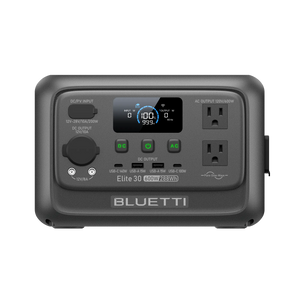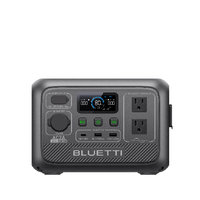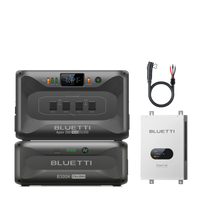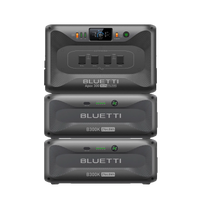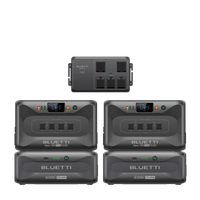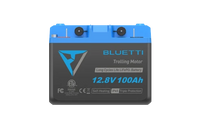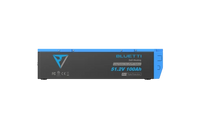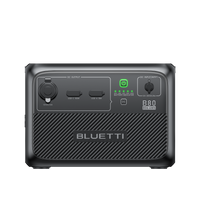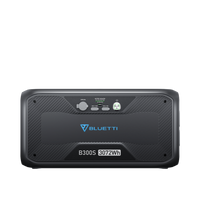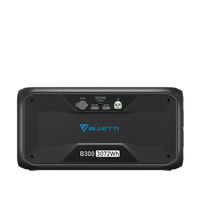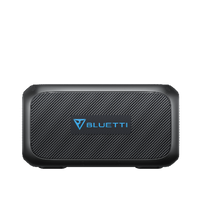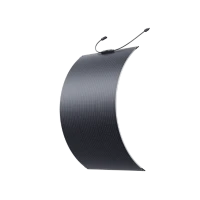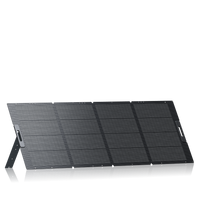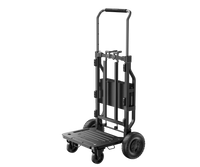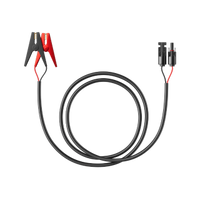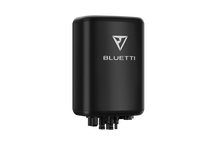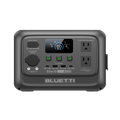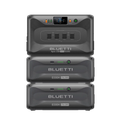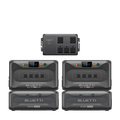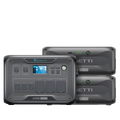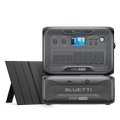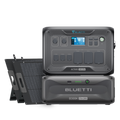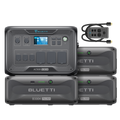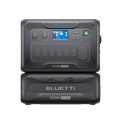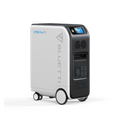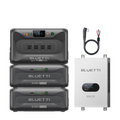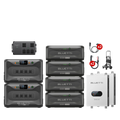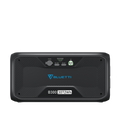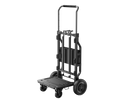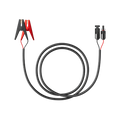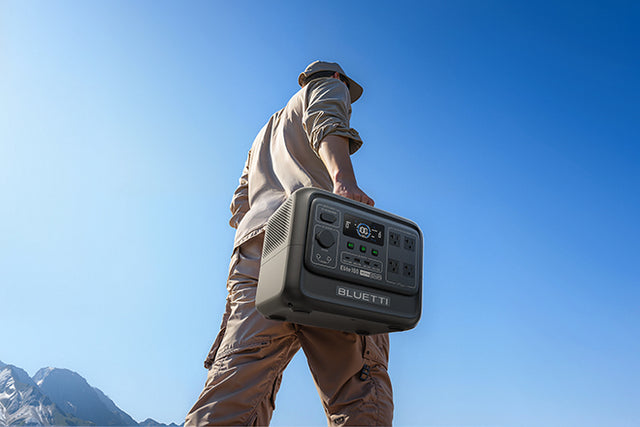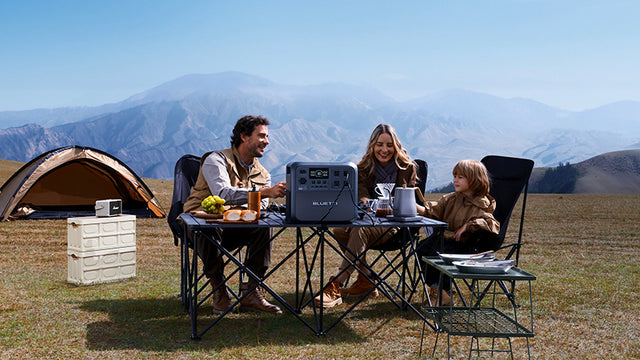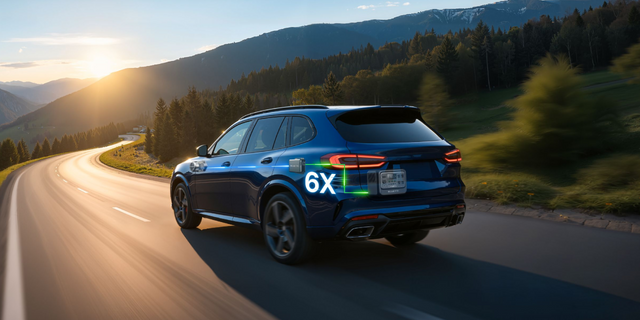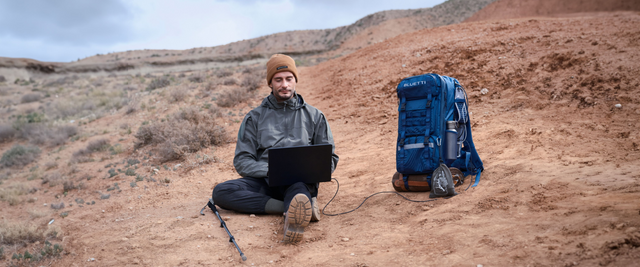Your cart is empty
Shop our productsA decade ago, as solar panels became more affordable and efficient, powering a food truck entirely with solar power seemed ambitious. Fortunately, massive advances in technology have now made it completely possible to run your food truck with solar panels.
In this article, we will talk about the things you need to consider before switching to solar energy for your truck, the benefits of using portable solar panels to power your food truck, and a lot more. Continue reading for the latest insights on using solar panels for your food truck.
Things to Consider Before Using Solar Power for Food Trucks
Several factors must be considered when deciding if a solar-powered food truck is a good option for your business.
Your Equipment
Before investing in solar panels, it's important to consider the kind of food truck you run. Different appliances need different energy levels, and depending on your food truck, you could be looking at a vast range of energy estimates.
For example, if you serve burgers and hot dogs during the day, a small grill and cooler can be powered by a portable solar panel. However, if you run a more high-end food truck offering various heated items in the evening, you might need an oven, multiple large grills, a freezer, and a cooler. For this, you might need a larger portable solar panel system.
Thus, you can see that your energy requirements will differ a lot depending on the appliances your solar food truck needs. The first step in retrofitting your food truck with solar panels is to measure your current kilowatt-hour (kWh) usage to estimate your daily energy needs.
The Location of Your Food Truck
When retrofitting food trucks with solar panels, many food truck owners don't consider where they'll park their food trucks daily. However, this is a critical factor to consider when planning to switch to solar. If you park your food truck in the same place every day, ask yourself if your truck is getting direct sunlight throughout the time you will be serving food. You can think about this based on your angle and location. If your answer is no, you might have to move your truck to a new location.
Backup Power Equipment
Even if you park your solar truck in a spot that receives plenty of sunlight, you should still keep a backup battery or alternative power source, such as a portable generator, for unpredictable situations like rainstorms. You don't want to be stuck without electricity due to a rainstorm, unable to serve customers because you lack a backup generator. It's extremely important to plan not only the best-case scenario but also the worst-case scenarios as well to ensure you're ready for anything when you head out to work. Being prepared for the worst-case scenario is something that's important in any business, particularly for people in the service industry.
You might just get a single chance to impress a customer, and if you're not able to serve them because your portable solar panels aren't generating sufficient energy, you might end up losing them for life. Ensuring dependable energy in all situations is critical, and while solar panels can be an excellent investment, it's essential to think about backup energy from a portable solar generator as well.
How Many Solar Panels Do You Need to Power Your Food Truck?
Here are the steps you need to follow to determine the number of solar panels you need to power your food truck.
Calculate the Energy Your Food Truck Needs
To determine the number of solar panels you need, you need to start by calculating your food truck's daily energy consumption.
Thus, depending on the equipment you require, you can determine your everyday energy requirement. You can get the values for most of the appliances on the tag nameplate or appliance nameplate.
Apart from that, the starting and operating voltage, wattage, and current in amperes will also be mentioned in the user manual of the appliance. Therefore, you can easily calculate the energy your mobile food truck requires. To determine daily energy consumption, follow these steps:
- Determine the number of watts you need to run your food truck.
- Determine the daily operating hours.
- Multiply the wattage by the hours.
Here's an example calculation.
Wattage needs are going to vary. However, most food trucks require a solar generator with 1,000–3,000 W output and 10–20 kWh capacity daily.
The time duration you wish to run the truck every day is another thing you need to pay attention to. If you only want to operate the truck for four hours every day, you won't require nearly as much capacity as if you plan to serve at all-day events.
For this example, we will use a regular 6 hours per day. A food truck with a 2,000 W average load for 6 hours requires 2,000 × 6 ÷ 1,000 = 12 kWh daily.
Here's a breakdown of different appliances for you to review:
|
Appliance |
Power (Watts) |
Average Daily Usage (Hours) |
Daily Energy Consumption (Wh) |
|
Refrigerator / Freezer |
400 – 800 |
6 |
2,400 – 4,800 |
|
Coffee Maker / Espresso |
800 – 1,200 |
2 |
1,600 – 2,400 |
|
Grill / Hot Plate |
1,000 – 2,000 |
3 |
3,000 – 6,000 |
|
Microwave / Oven |
1,200 – 1,800 |
1 |
1,200 – 1,800 |
|
Blender / Mixer |
300 – 600 |
1 |
300 – 600 |
|
Lights (LED strips, bulbs) |
50 – 200 |
6 |
300 – 1,200 |
|
Cash Register / POS |
100 – 200 |
6 |
600 – 1,200 |
|
Fans / Ventilation |
50 – 300 |
6 |
300 – 1,800 |
|
Water Pump |
200 – 500 |
1 |
200 – 500 |
Calculate the Daily Solar Panel Energy Production
Divide your daily energy requirement (Wh) by peak sunlight hours to determine total panel wattage, then divide by the wattage of each panel.
For example, in California, with 5.82 hours of peak sunlight, a 12 kWh need requires 12,000 Wh ÷ 5.82 hours ÷ 0.8 ≈ 2,577 W, or ~10–13 250 W panels.
You need a solar generator with 10–20 kWh capacity and 1,000–3,000 W output, plus ~10–13 250 W panels for 12 kWh daily needs, accounting for 80% efficiency.
Benefits of Solar-Powered Food Trucks
Solar food trucks are one of the best inventions of the green food movement, and it sure looks like they are here to stay.
When we talk about the benefits of a solar food truck, the first and most significant benefit is related to the cost. For a lot of food truck owners, portable solar panels are a cost-effective source of energy. In fact, switching to portable solar panels can save food truck owners hundreds of dollars monthly.
Gas-powered generators provide light and heat and power appliances such as refrigerators, electric stoves, etc. Buying gas for the generators makes up a significant and unavoidable monthly expense.
Moreover, it's a well-known fact that fuel, diesel, or propane generators are great pollutants, and many eco-conscious food truck owners are now switching to solar energy. Portable solar panels and solar power generators are excellent off-grid alternative energy sources for food preparation and light.
All in all, these eco-friendly food trucks have been increasing in popularity over the past ten years. With several benefits that include a lower carbon footprint, reduced operating costs, and increased visibility of the growing sustainable living movement, there is no good reason for food truck owners to say no to moving to solar energy.
BLUETTI Portable Solar Generators & Solar Panels for Food Trucks
At BLUETTI, we have a vast range of portable solar generators. If you run a food truck and are looking for portable solar panels and solar generators, you can check out our products.
Portable solar generators are safe for indoor use, as they don't use fossil fuels and emit no fumes. Many models, including BLUETTI's, feature rechargeable batteries and operate silently without engines.
Thanks to their lightweight design, several solar-powered generators are extremely portable. You can easily carry them around in case you plan to change the location of your food truck. Some of them are also foldable, so you can fold them and keep them inside your truck when not in use.
BLUETTI AC200L Solar Generator
You can get our Solar Generator Kit for Food Trucks featuring the BLUETTI AC200L. This kit comes with 2,048Wh capacity (expandable up to 7,577.6Wh) and a 2,400W AC output (4,800W surge), perfect for running multiple kitchen appliances, refrigerators, coffee machines, or heating equipment in your food truck.
It supports fast charging in just 1.5 hours via AC (2,400W input) and 2.5 hours via 1,200W solar input, with additional options like car, generator, dual AC, and combined solar + AC charging. The LiFePO₄ battery with 3,000+ cycles ensures long-lasting performance, reliability, and safe operation for mobile food businesses.
With UPS support (20ms switch time), multiple AC/DC/USB ports, Power Lifting Mode (3,600W surge), and expandable battery options, you can run high-demand devices while keeping your operations smooth. The kit is portable, solar-ready, and app-controlled via WiFi/Bluetooth, making it ideal for off-grid food trucks, catering, or pop-up kitchens.
BLUETTI 350W Solar Panel
The BLUETTI 350W Solar Panel offers a high conversion rate, ensuring your solar generator charges efficiently even on cloudy days. Its foldable and portable design makes it perfect for food trucks, camping, or any off-grid setup, while the included kickstand allows easy setup anywhere.
Built to last, the panel is durable and splash-proof, capable of handling outdoor conditions without compromising performance. It's fully compatible with BLUETTI AC200P, AC200MAX, AC300, Apex 300, and AC500, giving you versatile power options for your mobile or stationary solar setup.
BLUETTI 200W Portable Solar Panel
The BLUETTI 200W Portable Solar Panel delivers 200W of solar power, efficiently converting sunlight into electricity to charge your solar generators. With up to 23.4% conversion efficiency, it maximizes energy harvest even on partly cloudy days.
Designed for outdoor adventures, it features IP67 water resistance, making it durable for camping, hiking, or fishing trips. Its foldable and portable design allows easy transport and quick setup, giving you reliable solar power wherever you go.
Solar-Powered Food Trucks in the US
A lot of food truck owners are taking their sustainability initiatives to the next level by investing in solar power for food trucks. Here's a list of some of the most popular solar-powered food trucks in the US.
Solar Crepes – Arlington, VA
The food truck uses organic and local food from sustainable sources. They even pack their food in environmentally friendly wrappers. Their food truck uses a 90-watt solar panel that generates around 590 watt-hours of energy daily.
Off the Griddle - Portland, OR
This burger joint serves vegetarian and vegan food using organic and natural ingredients. Their truck uses renewable energy, with excess potentially stored or used off-grid.
The Green Truck – NYC, San Diego, Los Angeles
The food truck serves sustainable, regional cuisine, including vegetarian and vegan dishes. It uses solar power to run its kitchens, with excess energy stored in batteries.

Last Few Words
Over the past ten years, these eco-friendly solar-powered food trucks have become increasingly popular. Food truck owners have compelling reasons to embrace solar energy, including lower carbon emissions and reduced operating costs.
Get the BLUETTI solar generators to power your food trucks. They're designed to offer complete energy independence with advanced connectivity.
FAQs
Can I run all my food truck appliances on solar power?
Yes, modern solar panels with high-capacity generators can handle most food truck appliances, including refrigerators, grills, and coffee machines, as long as your system is properly sized.
How many solar panels do I need for a food truck?
Typically, 10–13 panels (200–350 W each) are needed for 10–15 kWh daily, depending on appliances and sunlight.
Are solar panels reliable in cloudy or rainy weather?
Yes, they still produce electricity in low-light conditions, and pairing them with a quality battery ensures your food truck continues to operate smoothly even on cloudy days.
